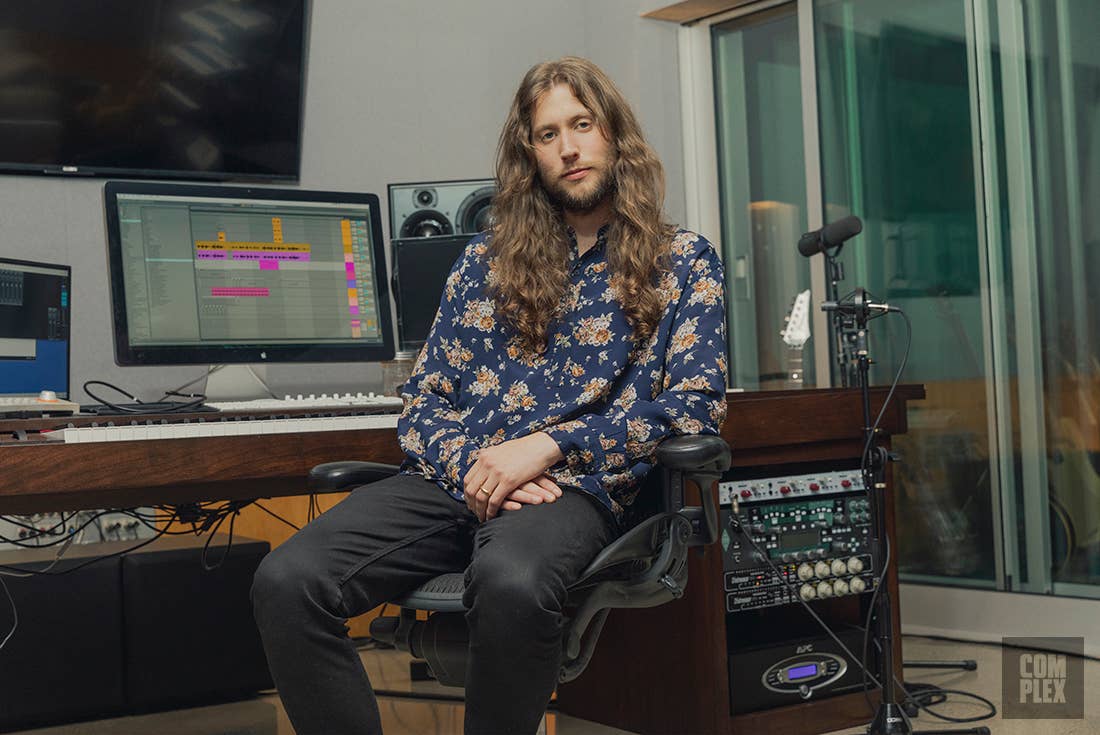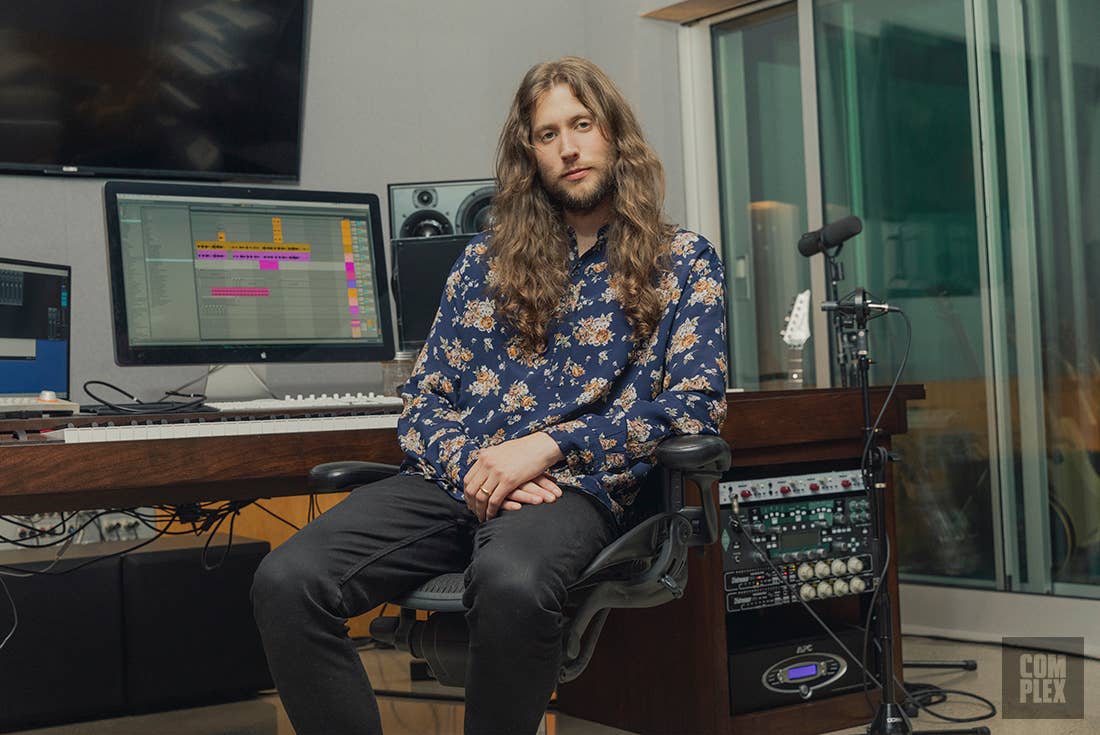
Ludwig Göransson still remembers crying during Edward Scissorhands.
“I was a teenager, and I realized why I was so emotional about the movie,” he says. Göransson’s eyes glaze momentarily as he reminisces on the 1990 film, before snapping back to the present: “I understood it’s because of the music.” Years later, his realization about the responsibility and power of a film score informs his mission on each project. He explains, “If you’re a film composer, you have the music tell the story of the character.”
That mindset is present in Göransson’s latest work, the Rocky franchise’s new entry Creed II. Applause bait is packed into the third act, as at should be in any self-respecting sports movie, but the moment that garners the biggest crowd reaction isn’t the climactic, Shakespearean fight between Adonis Creed and Viktor Drago. It’s the near-wordless training montage that precedes it—complete with a rousing score to make the audience double down in rooting for our hero (and inspire us to run home after the movie).
In a scene almost entirely bereft of dialogue, Göransson is left to his own devices to capture all the emotions, the stakes, and the try-fail-try-succeed process with every trick in his arsenal. The result is a tour de force that’s a mini-film unto itself, featuring a composition that blends sweeping orchestral swells with electronic elements, operatic vocals, and, as the tide turns to success, hip-hop. Which is to say, it’s a definitive Ludwig Göransson piece of music. Michael B. Jordan makes the B stand for bionic, running so fast he looks like he’s about to break the sound barrier, his energy and the score engaging in a symbiotic crescendo.
Two weeks before Creed II’s world premiere in New York, this is the sequence the 34-year-old musician is most excited for us all to see. “There’s no dialogue; it’s, like, a six-minute short film,” Göransson teases. “There’s a start and an end to it, and that was the most fun part of the score. It’s also the most challenging because it goes in between all the themes.”
We’re in Göransson’s studio in Glendale, California, in a windowless, soundproof recording space. It’s where Göransson has been working for three years, composing, scoring, and producing—making crucial contributions to some of the most important, influential pieces of entertainment of the last several years.
A modest hallway adorned with some of Göransson’s plaques separates the lobby and the studio, but expansion is underway, and in a few months the square footage will double, with more space to create and relax. There’s even talk of adding a Ping-Pong table that will rise up from the floor. After the year Göransson’s had, his 10th in the industry, a bigger space to create is necessary. His fingerprints have been on some of the buzziest movies, TV, and music released in the past decade, but in 2018 he reached new heights. His year began with a massive blockbuster named Black Panther (which featured some of his most involved work to date on both the score and its original soundtrack), was anchored by co-production on the most arresting song-and-video combination of the year in Childish Gambino’s “This Is America,” and ended with Creed II. Until now, Ludwig Göransson’s name was recognized on a mostly “if you know, you know” basis, but as 2018 draws to a close, his anonymity is drawing its last breath.
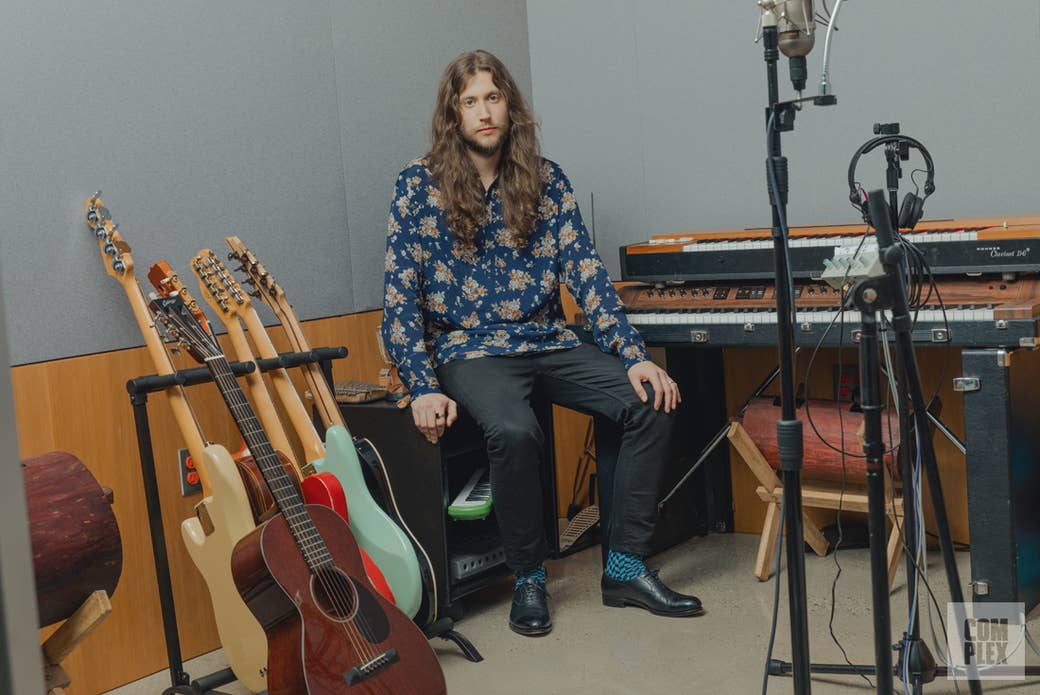
On January 28, Göransson walked the red carpet at the Grammys in New York with Donald Glover, his friend and collaborator of eight years. They were both in attendance for their Album of the Year-nominated Awaken, My Love!—Göransson is a co-producer and co-writer on nearly every song. That evening, Glover performed their new single “Terrified,” while the acclaimed, four-times platinum smash “Redbone” snagged the trophy for Best Traditional R&B Performance. The next night in L.A., Göransson attended the world premiere of Black Panther, the phenomenon-on-arrival blockbuster debut of his friend and collaborator of 10 years Ryan Coogler.
Göransson views his 2018 milestones as years of hard work for his friends paying off at the same time. “Everything’s been in small stepping stones,” he says of the journey from his native Sweden to USC to study film composing. “I came here 11 years ago, working on indie and student films first. Then, Ryan’s first film was an indie feature, and I also started writing music for TV shows. I met Donald, we started writing a mixtape together called Culdesac, and got signed. The first album was more of an indie vibe album, so every year, going from Fruitvale Station to Creed, then going from Creed to Black Panther, it’s not like I’m waking up today and I’m like, ‘Oh, shit—this is all new.’”
Göransson has a way of matter-of-factly recounting how he formed bonds with people who would become this generation’s premier directors and musicians. He adds, “But it is interesting how a lot of the hard work comes [to fruition at once]. You can compare Ryan’s career [arc] with Childish’s, a little bit.” Göransson shrugs, “We’ve been working together for 10 years. I worked with Ryan for 10 years and Donald for 10 years. The same year, they’re blowing up, and I’m just here for the ride. I’m just lucky to be able to ride it.”
If that reads as zen and disarmingly serene, know that it doesn’t even do full justice to Göransson’s demeanor in person. The only thing about him that’s approaching any kind of high volume is his personal style (today it’s a deep blue floral print shirt complemented by light blue checkerboard socks, on carpets he favors a flashy blazer). Göransson, with his long, flowing Jesus hair and a visage that simultaneously communicates calm and curiosity, has a preternatural air of contentment.
“You can compare Ryan [COOGLER‘S] career [arc] with Childish [GAMBINO‘S] a little bit.”
One thing that’s remained consistent throughout Göransson’s life has been his love of music. Growing up in Linköping, Sweden, he had a guitar in his hands by the age of 6, courtesy of his father, who taught lessons at the local music school. By 9, he was practicing 10 hours a day to indulge an obsession with Metallica. “I went from that to jazz and got really into George Benson and Wes Montgomery and trying to play their music on a jazz guitar,” he notes. “Then I got into film scoring through John Williams and Danny Elfman. Those are some of my early heroes.”
After studying jazz at Royal College of Music in Stockholm, Göransson set his sights on America to pursue dreams of film scoring at USC. This is where he met Coogler, who, when crafting his debut film, Fruitvale Station, years later, would ask his friend Ludwig if he would score it. It’s on that film that Göransson began to hone his particular approach to film composing. To prepare for Coogler’s intimate take on the true story of Oscar Grant’s final day before being murdered by authorities at a BART train station, Göransson visited the site in Oakland.
“The through line of the way I like to work, what makes me different, and what I like to do for every project—although they are completely different from each other—is I like to do a lot of research and create a unique landscape and unique soundscape for each movie,” he explains. “Fruitvale Station, for example, it takes place at the BART train station in Oakland, so I went there. I recorded the train sounds. I took those train sounds and I made them into pads and loops and music.” For Creed, Coogler’s next movie, the composing field trip was, naturally, to a boxing gym. Göransson recorded a boxer working out, jumping rope, and hitting the pads for two days. Then he took the recordings back to the studio, where he used them as source material for beats.
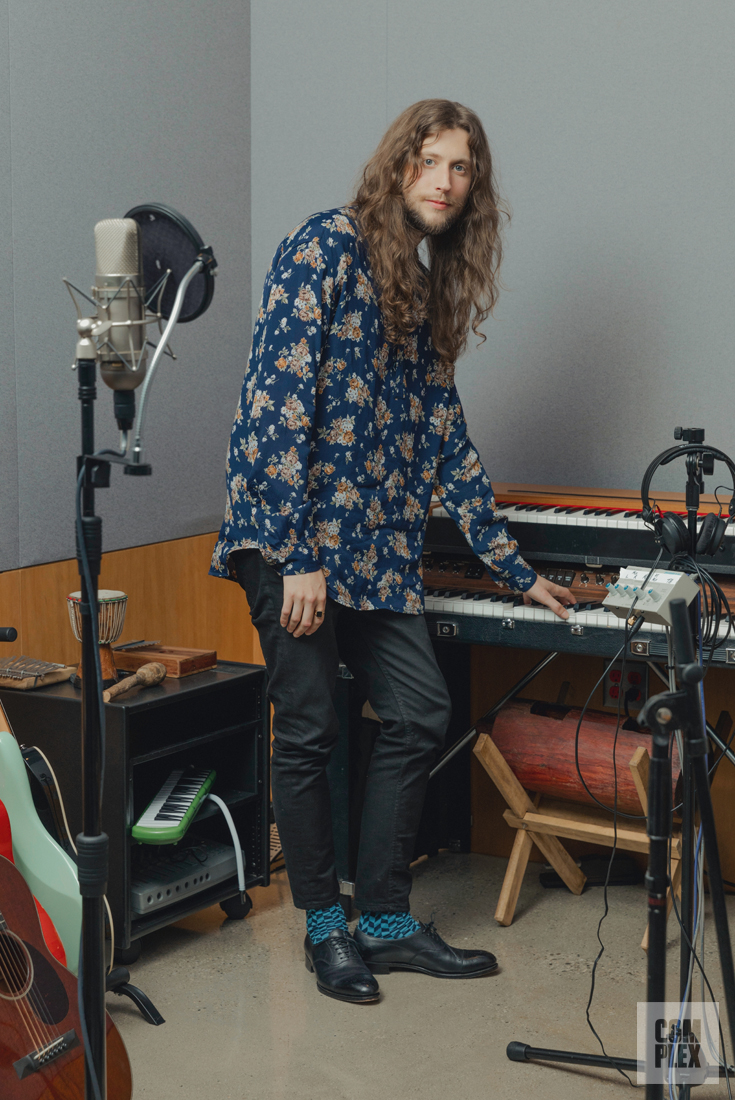
Since Fruitvale, Göransson has worked steadily in Hollywood, scoring A-list comedies, thrillers, and action movies, building a filmography in disparate genres, nevertheless united by his methods. This fall, before Creed II, he worked on Venom (directed by Ruben Fleischer, who in 2011 directed 30 Minutes for Less, Göransson’s first composer credit), whose themes of fractured duality he helped enhance. “I recorded a bunch of original sounds, like vocals—a lot of human sounds—and percussion, synths, and guitar,” he says. “And I kept all those sounds in that way for Eddie [Brock’s] character. But then I took the [same] sounds, processed them and made them sound extraterrestrial, and put those into Venom’s character. Needless to say, I like to create a unique sound for each project I do.”
Explaining the benefits of working with a close friend like Coogler, Göransson notes, “Ryan, because we have a relationship, he contacts me very early in the process. He sent me the script for Black Panther while he was writing it, and I was able to really early have a conversation with him on what he was looking for.”
As Coogler prepared to direct his biggest film to date, Göransson rose to the occasion. “I quickly realized that there’s no way I would be able to score this movie without going to Africa and immersing myself in the culture, and studying and learning with African musicians,” he says. “It was a much larger process than spending two days on something.”
The trip to Africa allowed Göransson to soak up a myriad of African music subsets from different regions. “When I recorded the fula flute, for example, I heard this guy, Ahmadu, he was playing this flute and I had never heard the sound before,” Göransson recounts excitedly. “It was screaming in it, and he was just whispering stuff in the flute, and it was such an impulsive, aggressive sound. So I was like, this reminds me of Killmonger’s character, from what I had read in the script. I was talking to the flute player about Killmonger’s character and he started playing, and it looked like he was a different person. It was hypnotizing. He started screaming ‘Killmonger’ in the flute, and I recorded it on my iPhone and I sent it to Ryan, who sent it to Michael B. Jordan as he was preparing for his role.”
Influencing and informing a film’s story through its score is, for Göransson, the composer’s mission statement. “Killmonger’s theme is a very interesting mix of sounds and genres,” he notes. “There’s the American 808 hip-hop sound to it. He also has a traditional African flute playing his theme, and then there’s an orchestral element on top of that. All those three elements fluctuate with his character. As his powers grow and he’s starting to take over Wakanda, the theme grows with him and gets bigger and bigger. There’s a scene where he says, ‘Burn it all,’ and the camera shifts and slides down. At that moment you have the hundred-piece orchestra playing his theme. That’s [an example] of changing someone’s theme up and continuing the storyline.”
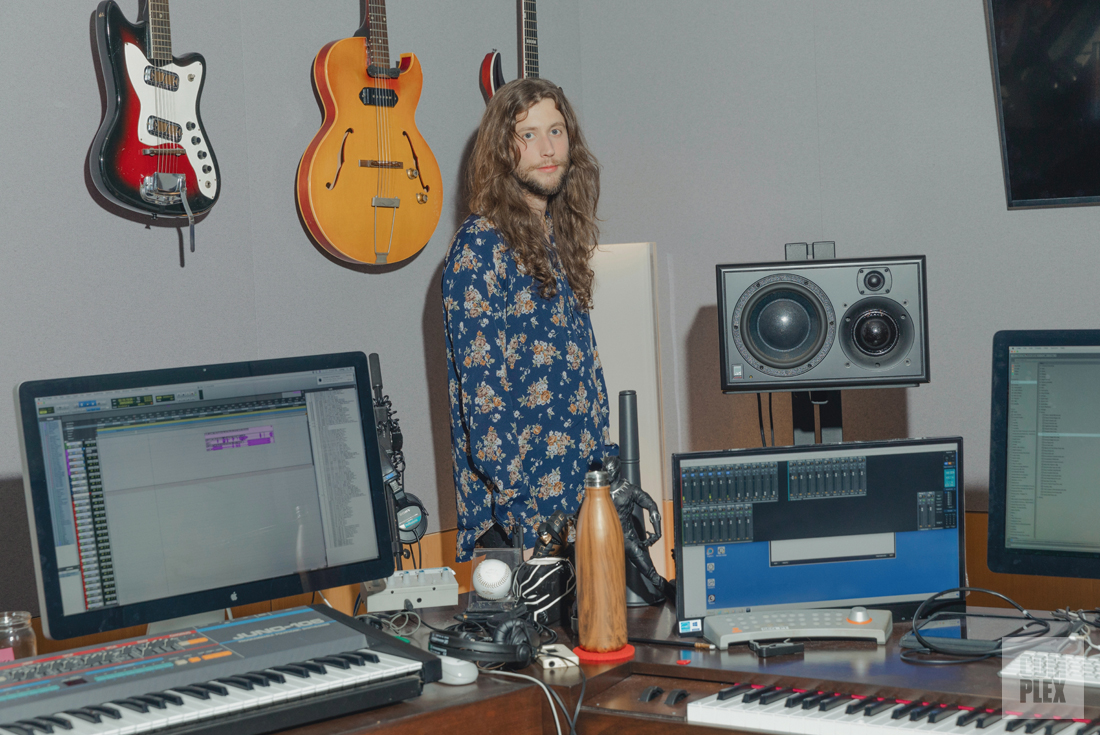
Göransson’s career would be thoroughly impressive if all he did were compose for film and TV. Factor in his work with Donald Glover, though, and his resume goes from accomplished to savant levels. Childish Gambino is typically perceived as Glover’s solo music alias, but consider that virtually every song he’s made under that moniker was co-produced by Göransson, and it seems more appropriate to view them as a band.
The two met on the set of Community, the cult-classic NBC sitcom that served as Glover’s first acting gig and one of Göransson’s first composing tenures; the birth of their musical relationship owes to The Great American Tail, of all things. Recording a rendition of “Somewhere Out There” for Season 1’s “Environmental Science” episode, Göransson first noticed that acting wasn’t Glover’s only talent: “A week later he emailed me out of the blue and was like, ‘I’m also a musician and I’m also a rapper and I’m releasing my mixtape pretty soon and I’m wondering if you know anyone who can mix it.’
“In the beginning, I wasn’t really sure what to think,” Göransson admits. “But he sent me a song and I [thought], ‘This is awesome. This is really dope.’ I email him back, ‘What if we record some of the drums live and what if we add something over here?’” That song was Culdesac’s “So Fly.”
“I don‘t speak for Donald, but I DOn‘T THINK We‘RE setting out to reinvent anything. We‘re just starting everything from a blank slate.”
Since then, Göransson has been alongside Glover on every step of his musical journey, and he’s seen the fluctuating levels of acclaim that followed. “I definitely remember [Camp] was really hated by critics. And I remember Awaken, My Love!, critics liked a bit more,” he says with a twinkle in his eye. Göransson describes the Camp era as “indie,” Because the Internet as “modern chaos,” and AML as funkadelic, but he says they were all born of the same carefree attitude. “We were still, at the time [and now], just working and doing music that we liked.”
Just don’t consider each era meticulously planned reinventions. “I don’t speak for Donald, but I don’t think we’re setting out to reinvent anything,” Göransson explains. “We’re just starting everything from a blank slate. When we started on Awaken My Love!, I had no idea where he was gonna go or where he was gonna take it, and that’s the most fun part of the process: being on this journey and experimenting.” Which is to say, don’t take “This Is America” as a grand re-pivot to rap after going funky on us. For one, Göransson says the album they had completed before AML came to fruition was weirder—along the same sonic vein of “Me and Your Mama”—and “America” was created in tandem sessions.
“From that whole album, that’s where ‘Me and Your Mama’ came from,” he points out. “I think it was before Awaken, My Love! that we kind of started an early idea of ‘This Is America.’ That was during the time where I was researching music for Black Panther, so that’s also why it had a little African feel to it.” Göransson isn’t just being coy when he says he has no idea what lane Glover will ultimately land on for their next album as Childish Gambino, and we shouldn’t take “America” or the Summer Pack EP as any kind of definitive clue. “That’s what I love about working with Childish—about working with Donald: Every day can be totally different.”
With only a few days left to go, it doesn’t look like a new Childish Gambino project will arrive before 2019, unless Göransson is one hell of a poker player. Even still, with Black Panther, Creed II (and their corresponding original soundtracks), Venom, Slice, Eli Roth’s Death Wish, “This Is America,” and the Summer Pack EP, it’s not as if his resume is hurting for one more addition.
Creed II is a strong cap to an incredible year, and Göransson’s immediate plans include vacation and falling back a little to hone his strengths. “I’m gonna buy some more books and take some lessons with a composer or a conductor,” he says. “I really want to get better at conducting. I want to be a better composer. These last years, I haven’t really had the time to study, and that’s something that I miss.”
Recent scores like the late Johan Johannsson’s work on Nicolas Cage’s comeback opus, Mandy, have Göransson inspired and eager to take time to get better at his craft. Of course, he capitulates, the best-laid plans are easily waylaid by a phone call: His 2019 is already beginning to fill up, with a prime assignment on Disney’s much-buzzed-about Star Wars live-action series, The Mandalorian.
“There’s so much fun stuff going on, and I want to be a part of it,” Göransson shrugs. “It’s hard to stop.”

